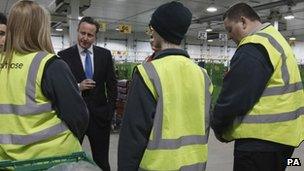Cameron pledge on EU institutions after veto
- Published

David Cameron says the UK economy must be rebalanced in favour of exports and manufacturing
David Cameron has promised to do "everything possible" to stop other EU states discussing the single market without the UK.
He said it would be "wrong" for states which signed up to a new eurozone pact to use EU institutions to discuss issues affecting other member states.
But he said the legal position was unclear and there were "difficulties" with the European Court of Justice.
The PM vetoed EU-wide treaty changes, saying they were not in UK interests.
Other European leaders had sought to rewrite the terms of the Lisbon Treaty - which governs the running of the EU - to bring about greater fiscal integration between eurozone countries.
'Worse position'
Following the UK veto, a new accord will be drawn up instead and is expected to be agreed by March.
Speaking to BBC Radio 4's Today programme, the prime minister again defended his decision on the grounds that sufficient safeguards to protect UK interests had not been included.
David Cameron: "I don't want to pull the wool over people's eyes, it's a difficult year, it's a testing year"
Pressed on what safeguards he had achieved by vetoing an EU-wide treaty, he said: "What I stopped was that if you have a treaty within the framework of the European Union that didn't have safeguards on the single market and on financial services, Britain would have been in a worse position.
"I am not making some great claim to have achieved a safeguard but what I did do was stop a treaty without safeguards."
He said the new accord - designed to tackle the eurozone debt crisis - should be about fiscal union and not the single market.
"They [the signatories] shouldn't be doing things that are about the single market or about competitiveness, and we will be very clear that when it comes to that you cannot use the European institutions for those things because that would be wrong," he said.
"You can't have a treaty outside the European Union that starts doing what should be done within the European Union and that goes back to the issue of safeguards."
Legal difficulties
Mr Cameron admitted there were "legal difficulties" surrounding the use of institutions - including the European Commission and European Court of Justice - but he said the single market was the number one reason for the UK's membership of the EU.
"We are there because we are a trading nation and we want access to the single market and a full say about the rules of the single market, and what we can't have is the single market being discussed outside of the European Union and we will do everything possible to make sure that doesn't happen."
Critics have argued that Mr Cameron's veto leaves the UK isolated.
For Labour, Shadow Foreign Secretary Douglas Alexander said: "David Cameron has today admitted that he secured no safeguards for the UK when he walked away from talks at last month's EU summit.
"Giving up on negotiations has compromised British interests, not safeguarded them, and means the UK will struggle to have a voice in talks that could have a profound effect on jobs and growth in Britain."
And UKIP leader Nigel Farage added: "David Cameron has finally admitted that he has not achieved some great safeguard for British business."
'Testing year'
In a wide-ranging interview, the PM also discussed the state of the UK economy - and his hopes for a recovery.
"Looking into 2012, one of the trends I hope to see happen is a fall in the level of inflation, so households feel under less pressure than they did in 2011," he said.
"But undoubtedly - I don't want to pull the wool over people's eyes - it's a difficult year, it's a testing year, but I think we need to meet these challenges with the sense that we can overcome them."
He said private sector employment was growing, exports were improving and there was "some reindustrialisation going on".
But he added: "There is a rebalancing taking place, but it's not going as fast as we'd like it to, we need to do better on that front."
Mr Cameron also said he would say more in the coming week about plans to curb the bonus culture in the City of London, describing the current system of rewards as "completely out of whack".